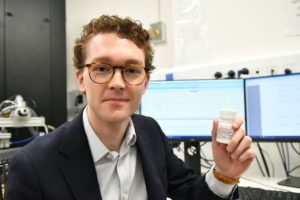Chronic breathlessness is very distressing and often prevents a good night's sleep. Now, new research at Flinders University is taking a detailed look at the sleep of people with Chronic Obstructive Pulmonary Disease (COPD), focusing on the benefits of using a low-dose daily morphine pill.

The trial, led by Flinders University sleep expert Professor Danny Eckert and respiratory specialist Dr Thomas Altree, is seeking people with COPD to take part in a two-week study assessing the effects of this common drug for breathlessness on sleep and breathing.
With the disease diagnosed in about 1 in 20 Australians aged 45 and over (ABS National Health Survey, 2017-18), the rate rises significantly among people aged over 75 years and is the fifth leading cause of death in Australia.
"COPD causes breathlessness during the day, but we often forget that it also causes major problems with sleep, due to coughing, lighter sleep and sometimes accompanying insomnia or sleep apnoea," says Dr Altree.
"In order to reduce breathlessness, doctors often prescribe low-dose morphine to people with COPD. It can be very effective, but we really don't fully understand how the drug actually improves breathing.
"One way we think it works is by improving sleep quality, which has flow-on effects for breathlessness the next day."

This research directly follows ground-breaking work done at Flinders University by Professor David Currow, a world expert on breathlessness, whose research led to morphine being licensed by the Therapeutic Goods Administration of Australia for chronic breathlessness in 2019.
Professor Currow, currently Deputy Vice-Chancellor of Health and Sustainable Futures at the University of Wollongong, is working with Dr Altree and Professor Eckert on this study.
Dr Altree says that the results of this study will have important implications for the way doctors treat COPD in the future.
"For the first time ever, this study will show the specific effects that morphine has on sleep in COPD. If we are to develop better treatments for breathlessness in the future, we need to answer these key questions about sleep and breathing in COPD."






